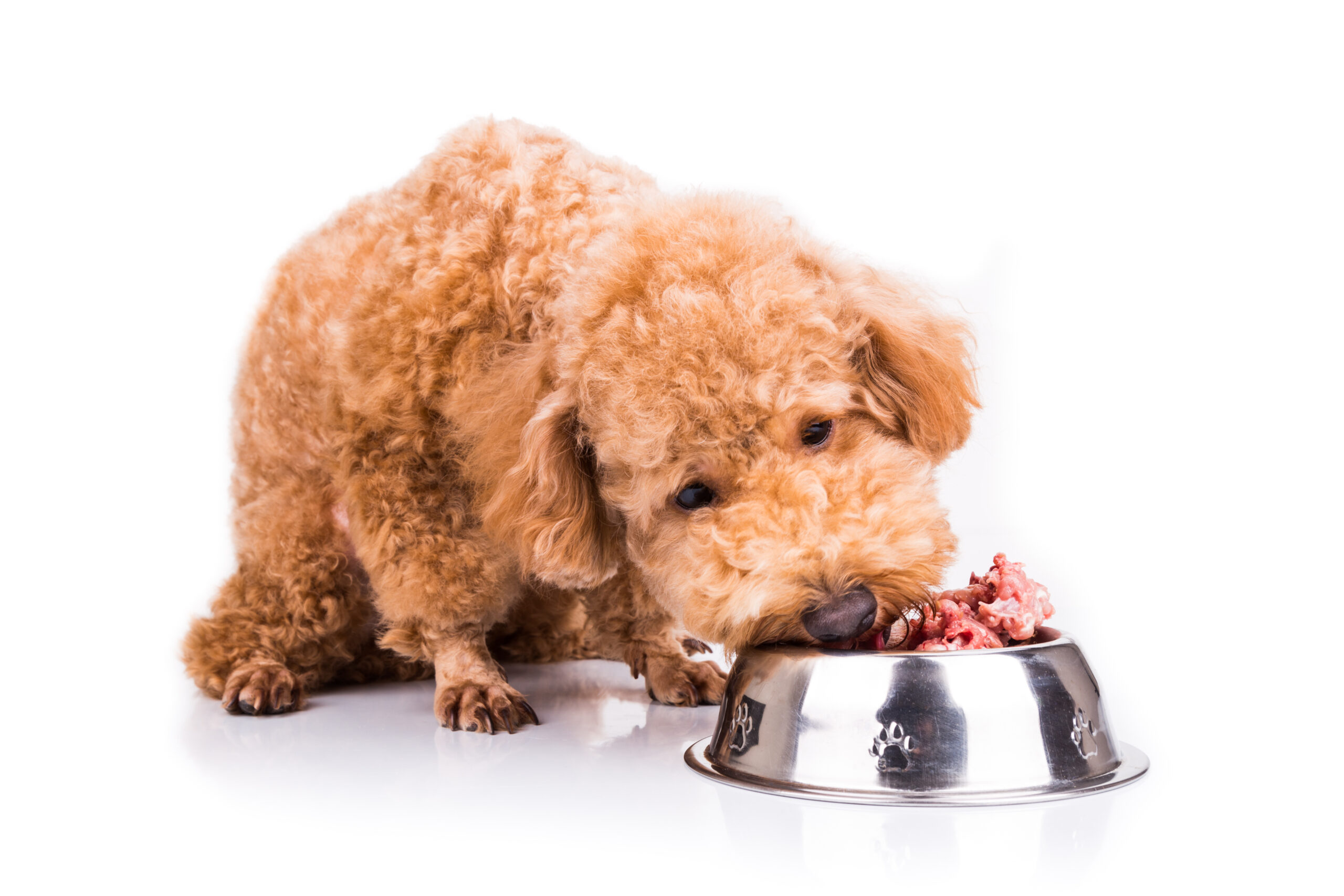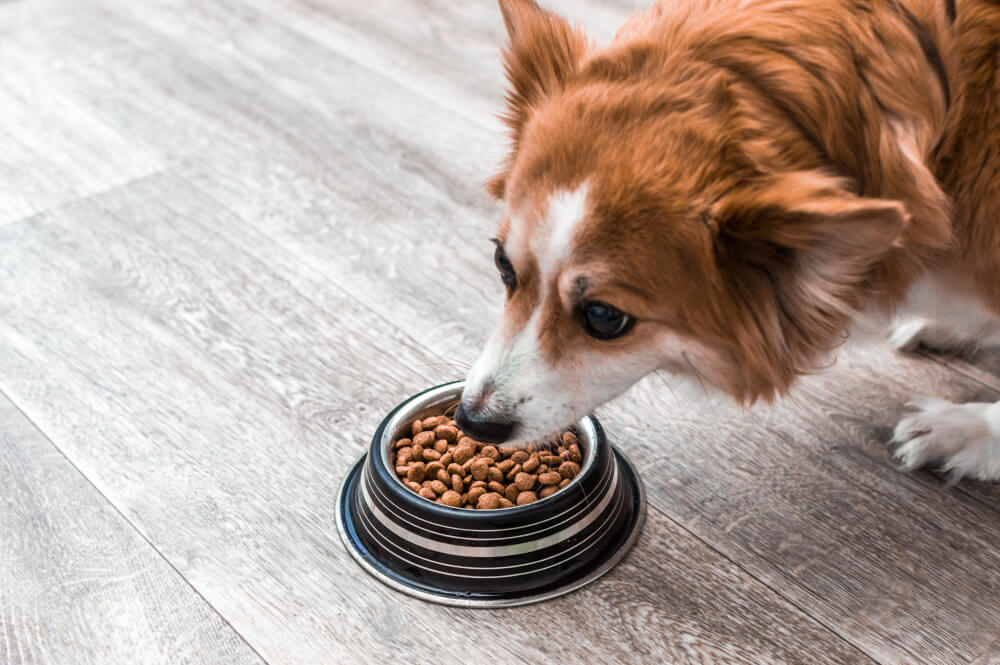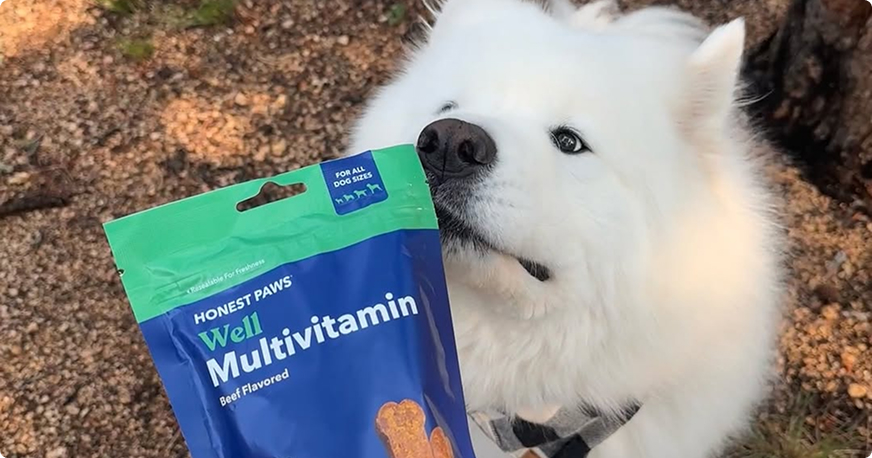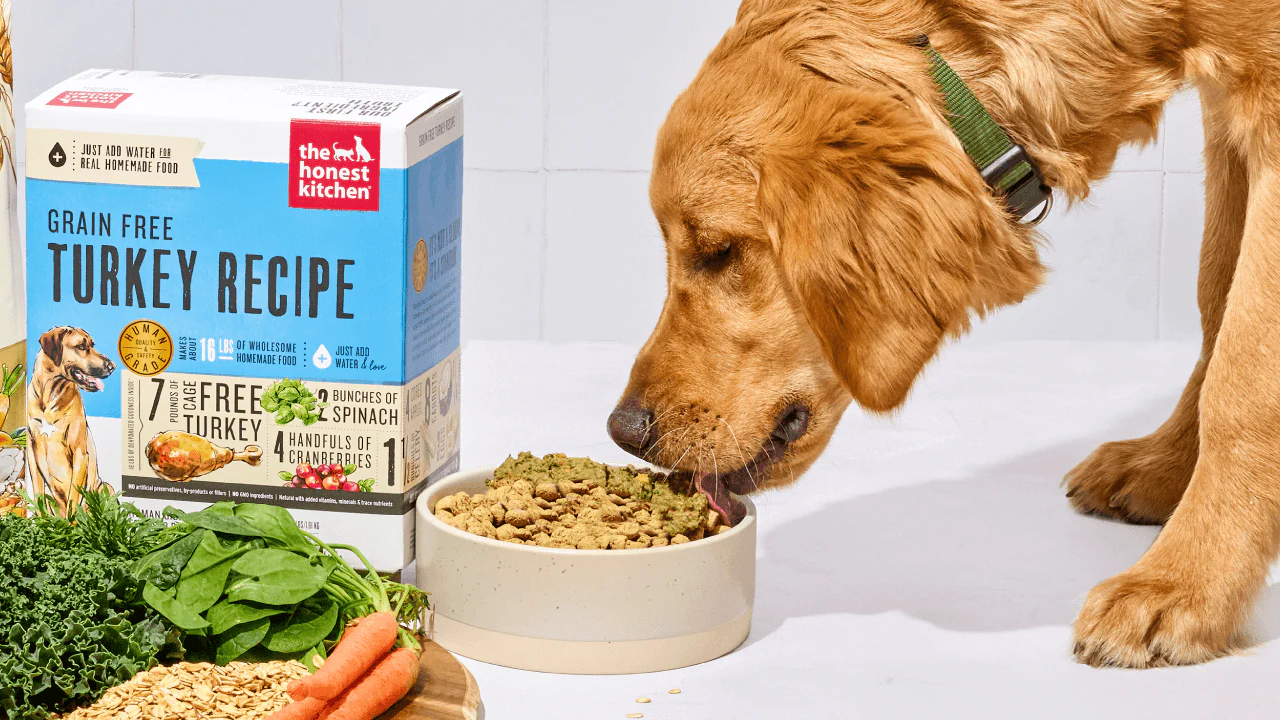Can Dogs Eat Beef?


Can Dogs Eat Beef?
Table of Contents
Quick Links
Beef is a high-quality and nutrient-dense red meat that offers various benefits, including optimal energy levels, strong immunity, and overall physical preparedness.
If you’re wondering if red meat for dogs is a healthy option, know that it can be, but it is important to prepare it correctly. The best cooking methods include boiling, roasting, and air-frying. Regardless of the cooking method, beef for dogs should always be served plain.
Organ meats from beef, such as liver, lung, heart, and tendons, are also nutritious for dogs. Additionally, beef jerky specifically made for dogs is beneficial and quite popular.
However, not all beef-derived products are safe for dogs. For instance, beef bones—especially when cooked—can be hazardous, as can beef fat.
Beef can serve as a staple or an addition to a dog’s diet, depending on their preferences and needs. When used as a staple, it can be served daily. So, the answer to the question “can dogs eat beef” is yes.
When introducing a new food to your dog’s diet, it’s advisable to consult a veterinarian. Some dogs may have allergies to beef protein or may benefit from other types of meat based on their individual health conditions.
Why Is Beef Good for Dogs?
Dog owners wondering “is beef good for dogs” will be happy to know that beef is good for dogs because it is rich in essential nutrients, like protein, vitamins, minerals, and omega fatty acids. Protein is the primary nutrient for dogs, necessary for growth, development, and tissue repair.
B-complex, A, and D vitamins are present in beef. Common minerals include iron, phosphorus, zinc, selenium, and potassium. Together, the beef’s vitamins and minerals support many body functions, from immunity to metabolism.
Omegas have an anti-inflammatory effect and support healthy skin and coat. They also nourish the heart and enhance cognitive function.
Organ meat sourced from beef, such as heart, lungs, liver, and tendons, is packed with taurine, collagen, elastin, chondroitin, and glucosamine. Taurine is vital for heart and eye health, while the other mentioned nutrients support joint function.
Incorporating beef into the menu adds versatility and palatability, which can be very helpful, especially if your dog is a picky eater. Lean and plain boiled ground beef can be used as a bland diet component as a chicken replacement for dogs sensitive to chicken protein.
The benefits of eating beef for dogs are listed below.
- High-quality protein source
- Loaded with vitamins and minerals
- Contains omega fatty acids
- Nutrient-dense beef organ meats
- Adds variety and palatability to the diet
- Good bland diet component
When Is Beef Bad for Dogs?
Beef is bad for dogs when served raw or undercooked, prepared with species or seasonings, or fed excessively.
Undercooked and raw beef harbors bacteria that can cause foodborne illnesses. Certain spices and seasonings upset the dog’s stomach, and others, like garlic and onion, are even toxic.
If served too often or in excessive amounts, especially if high in fat, it contributes to unnecessary weight gain and obesity. The fat content is also likely to trigger pancreatitis.
Beef meat is also bad if served to dogs with certain health conditions. For example, beef is not suitable for dogs with beef allergies, pancreatitis, or advanced kidney disease.
In allergic dogs, beef provokes the immune system, causing allergies. Dogs with pancreatitis require low-fat diets, while those with kidney problems need diets with limited protein.
Can Dogs Eat Raw Beef?
Yes, dogs can eat raw beef, although it is generally not advisable. In recent years, raw meat has become a popular dietary choice for dogs as a more natural option.
However, raw foods, including beef, can pose risks. According to the USDA, raw beef may contain harmful bacteria, such as E. coli and Salmonella. These bacteria can make pets ill. Therefore, while the answer to the question “Can dogs eat raw beef?” is yes, it is important to be aware of the associated risks.
Raw meat has its benefits as well. It provides high levels of protein, vitamins, and minerals, which are some reasons why raw beef can be suitable for dogs. Additionally, cooking meat can remove some of its nutrients, making raw beef potentially more nutritious.
Lastly, pet owners may wonder, “Is raw beef fat good for dogs?” While beef fat can be beneficial in small amounts and on rare occasions, excessive consumption can lead to digestive issues, weight gain, and pancreatitis..
Can Dogs Eat Ground Beef?
Yes, dogs can eat ground beef. Plain, cooked, and lean ground beef is a nutrient-packed and high-quality meat option for dogs.
Ground beef is good for dogs because it is high in protein and contains ample amounts of some vitamins, such as A, D, B6, and B12, and minerals, like iron, zinc, phosphorus, selenium, and potassium.
When asking “Is ground beef good for dogs of all ages?”, the answer is yes. Well-cooked and plain ground beef can be used for all dogs, including puppies and seniors.
All in all, pet owners wondering, “Can dogs eat ground beef?” can rest assured that the answer is yes. Ground beef is an excellent protein source for dogs, providing essential nutrients for a healthy diet.
Can Dogs Eat Beef Steak?
Yes, dogs can eat beef steak. When prepared correctly and served in moderation, beef steak can be a tasty and nutritious treat for dogs.
However, there are important guidelines to follow. Steak for dogs should be thoroughly cooked and served plain, without any seasoning. Additionally, all bones must be removed before giving it to your dog.
If you’re wondering, “Can dogs eat beef steak?” The answer is generally yes. Dogs can enjoy steak as a treat. But if you are asking, “Is steak good for dogs?” or “Is steak healthy for dogs?” The answers are more nuanced.
While steak can be a good treat, it should not be a staple in your dog’s diet. It can be healthy, but if not prepared properly or if given in excess, it may pose more risks than benefits.
For instance, spiced or seasoned beef steak can lead to digestive issues, and fatty steak may trigger pancreatitis in some dogs. Additionally, steak bones can pose choking hazards and risk of internal injuries.
What Happens if a Dog Eats a Steak Bone?
If a dog eats a steak bone, pet owners should pay attention for signs of digestive or respiratory distress. Despite what cartoons might suggest, the answer is no: dogs should not eat steak bones. Consuming cooked bones can lead to serious health issues, as they are brittle and can cause damage to a dog’s mouth and digestive tract.
Some potential consequences include choking, intestinal blockages, peritonitis (a life-threatening infection of the lining of the abdomen), rectal trauma, and constipation.
Raw steak bones are also dangerous. While they are less brittle, they can carry harmful bacteria such as E. coli and Salmonella, which can result in digestive problems.
Although chewing on raw steak bones can effectively reduce plaque and tartar buildup, supporting dental health in dogs, it can also lead to oral lesions. A study titled “Evaluation of Teeth Injuries in Beagle Dogs Caused by Autoclaved Beef Bones Used as a Chewing Item to Remove Dental Calculus,” published in PLOS ONE in 2020, highlights this concern.
In summary, pet owners who wonder, “Can dogs eat steak bones?” should be aware that the safest answer is no, as steak bones pose numerous hazards to dogs.
What Are the Risks of Feeding Beef Steak Fat to Dogs?
Feeding beef steak fat to dogs carries several risks, including digestive upset, weight gain, and pancreatitis. Fatty foods can upset a dog’s stomach and lead to long-term weight gain.
A study published in the Journal of Veterinary Internal Medicine in 2022 states, “High fat diets induce or worsen the severity of pancreatitis in dogs,” highlighting the dangers of feeding high-fat foods.
If you’re wondering, “Can dogs eat steak fat?” The answer is that it depends. An occasional small bite isn’t immediately harmful, but it’s not advisable to regularly or intentionally feed dogs steak fat.
Can Puppies Eat Beef?
Yes, puppies can eat beef. Beef is a protein-rich and nutrient-dense food that is safe for puppies.
Cooked, lean ground beef is the best option for puppies. It should be served in moderation and as part of a complete and balanced diet.
Before introducing any new food to a puppy’s diet, it is advisable to consult a veterinarian. Puppies have sensitive stomachs, so new foods should be introduced gradually.
Since beef allergies can occur in puppies, start with a small amount of beef and observe how your puppy reacts. If there are no signs of an allergic reaction, you can gradually increase the portion size.
Can Dogs be Allergic to Beef?
Yes, dogs can be allergic to beef. A beef allergy occurs when a dog’s immune system mistakenly identifies beef protein as a threat and responds by attacking it.
Any dog, regardless of age or breed, can develop a beef allergy. In fact, beef is the most common food allergen for dogs, according to a study titled “Critically Appraised Topic on Adverse Food Reactions of Companion Animals (2): Common Food Allergen Sources in Dogs and Cats,” published in BMC Veterinary Research in 2016.
Beef allergies in dogs can manifest through skin or gastrointestinal symptoms. Allergy-related skin issues may include itchiness and frequent ear infections, while diarrhea is the primary digestive symptom associated with this allergy.
How Much Beef Should You Feed Your Dog?
The recommended serving size of ground beef for dogs is about ⅓ of a pound per 20 pounds of body weight. However, it’s important to stress that beef should not be the only food in your dog’s diet—it must be part of a balanced meal plan that includes other nutrients.
For small dogs (up to 10 pounds), ¼ of a pound of beef per day is sufficient. Medium-sized dogs (around 20 pounds) can have ⅓ of a pound daily, while large dogs (40 pounds) can eat up to ⅔ of a pound. Extra-large dogs (over 60 pounds) can safely consume one pound of beef per day.
These portions are based on a diet consisting solely of beef, which is not recommended. Feeding only beef can lead to nutritional deficiencies, as it lacks essential nutrients like calcium, fiber, and certain vitamins. If you’re combining beef with other protein sources or ingredients, the serving size should be adjusted accordingly to maintain a balanced diet. Always consult your vet to ensure your dog’s meals meet their specific nutritional needs.
What Types of Cooked Beef Are Good for Dogs?
Cooked beef, whether boiled, roasted, or air-fried, is good for dogs. Cooking is recommended to prevent bacterial infections due to meat contamination.
However, not all cooking methods are equally dog-friendly. For example, frying adds fats and is unhealthy. Boiled, roasted, and air-fried cooked beef is best. Cooked beef for dogs must always be prepared plain.
Can Dogs Eat Boiled Beef?
Yes, dogs can eat boiled beef. Boiled beef is a healthy and nutritious addition to a dog’s diet, providing a good source of high-quality protein.
Always buy beef from reliable sources and choose lean cuts. If necessary, trim off excess fat before boiling.
When preparing boiled beef for dogs, it should be cooked plain, without salt, spices, seasonings, or sauces. It is best to cook the meat at low temperatures for a longer period.
Cooking at high temperatures or boiling the meat too quickly can cause the muscle fibers to contract and become tough, resulting in a dry and chewy texture. Similarly, if the meat isn’t boiled for long enough, the connective tissue won’t have sufficient time to break down.
Can Dogs Eat Roast Beef?
Yes, dogs can eat roast beef. When prepared correctly, roast beef is a safe and healthy addition to a well-rounded and balanced diet for dogs.
However, it is important to cook the roast beef plain, without any seasonings or spices, especially those containing garlic or onion, as these are toxic to dogs.
Before cooking, be sure to trim away any large pieces of fat. Excess fat can lead to digestive upset or even pancreatitis in dogs.
When serving roast beef, cut it into small pieces to make it easier for your dog to chew and swallow, especially for smaller breeds.
What to Consider Before Giving Your Dog Beef?
You should consider your dog’s nutritional needs and overall health before giving them beef. Beef is an excellent protein source, but it is too nutrient-dense for dogs with sedentary lifestyles.
Beef must also never be served to dogs with allergies to beef protein. Dogs with kidney disease are allowed to eat beef, but only if it is it is lean, cooked plain, and consumed in moderation.
Finally, before giving your dog beef, think about its taste preference. Every dog is different, and while some prefer beef, others may enjoy chicken, lamb, or venison more.
What Are the Best Beef Parts for Dogs?
The best beef parts of beef for dogs are listed below.
- Beef Liver: Beef liver is a powerhouse for dogs, providing various essential nutrients, such as protein, vitamins, and minerals. Beef liver for dogs is best served cooked.
- Beef Hearts: Packed with protein, vitamins from the B complex, iron, taurine, CoQ10, collagen, and elastin, beef hearts are an excellent treat for dogs.
- Beef Lungs: Beef lungs are a natural and nutritious organ meat for dogs. They have a soft texture and are therefore suitable for puppies and senior dogs.
- Beef Tendons: Rich in joint-friendly nutrients, beef tendons support arthritic dogs, while also promoting dental health. Beef tendons for dogs can be served cooked or raw.
1. Beef Liver
Beef liver is safe and suitable for dogs. The organ meat is rich in protein, minerals (iron, copper, and zinc), and vitamins (A and B complex).
Proper growth and development, muscle repair, joint health, boosted cognitive function, and improved heart and blood health are some of the benefits associated with beef liver.
It is recommended to serve cooked beef liver for dogs. Cooking softens the liver and makes it easier to digest, while also removing potential pathogens.
Feeding raw beef liver is possible, but only if it is sourced and handled responsibly. Low-quality raw beef liver can harbor E. coli and Salmonella.
2. Beef Hearts
Beef hearts are loaded with B vitamins and iron. They are also a high-quality protein source and contain ample amounts of taurine.
Taurine is a specific amino acid that supports heart health. Taurine is essential for eye wellness, too, promoting healthy vision.
Beef heart for dogs is an excellent source of CoQ10, collagen, and elastin. Coenzyme Q10 is a powerful antioxidant, while collagen and elastin promote good joint health.
Beef heart for dogs is served cooked or raw. Hearts are a type of organ meat and should not be used as a staple, but rather as a treat or food addition.
3. Beef Lungs
Beef lungs are a protein-rich, low-fat organ meat option for dogs. They are also high in collagen, vitamins A and B, and certain minerals, such as iron.
With a chewy, yet soft texture, beef lungs promote dental health and are suitable for dogs of all ages. They are extremely palatable and easy to digest.
Beef lung for dogs can be given raw or cooked. Raw beef lungs retain more nutrients, primarily fragile ones, such as omegas.
However, cooked beef lungs are safer in terms of contamination. Air-frying and gentle cooking are preferred preparation methods because they remove pathogens while preserving most of the nutrients.
4. Beef Tendons
Beef tendons for dogs are an excellent natural snack. They are excellent sources of protein and several joint-friendly nutrients, including glucosamine, chondroitin, and collagen.
Tendons have a chewy texture that supports dental health. Plus, beef tendon for dogs is low in fats and represents a grain and gluten-free treat option.
Beef tendons can be served cooked or raw. Raw beef tendons are better for dental health and a more natural chewing experience.
However, it is critical to supervise dogs when chewing on beef tendons and discard them when they become dangerously small.
Why Is Beef Considered the Best Red Meat for Dogs?
Beef is considered one of the best sources of red meat for dogs due to its high nutrient density. It is rich in myoglobin, a protein that stores oxygen in muscle cells.
Dogs can safely consume red meat, which serves as a healthy and beneficial source of protein. Red meat provides a versatile amino acid profile and healthy fats.
However, red meat should be fed in moderation. In humans, excessive consumption of red meat is associated with an increased risk of heart disease, certain types of cancer, and kidney problems. While the same connection between red meat and health issues in dogs has not been scientifically proven, it is wise to be cautious and offer beef and other red meats in moderation.
Is Hamburger Beef Good for Dogs?
Yes, ground beef is a good option for dogs when prepared correctly. It serves as a healthy protein source.
When serving hamburger meat to dogs, it should be thoroughly cooked and plain, without any added salt or spices, especially those containing onion or garlic. Additionally, use little to no oil when preparing it.
Always choose lean ground beef to reduce fat content, which helps minimize the risk of digestive issues, unnecessary weight gain, and pancreatitis.
Is Beef or Chicken Better for Dogs?
Both beef and chicken are safe, protein-rich, and beneficial for dogs. The better choice depends on individual needs and preferences.
Chicken is easily digestible and has lower fat content, while beef has a more versatile nutritional profile. Chicken is better for dogs with sensitive tummies and those on weight control regimens, and beef is better for active and working dogs.
Both beef and chicken are common allergens for dogs. When deciding which is better, it is vital to consider potential food allergies and sensitivities.
Which Beef Processed Meats Are Good for Dogs to Eat?
The processed beef meats that are good for dogs to eat are listed below.
1. Corned Beef
Corned beef is not recommended for dogs. As a type of canned beef, it contains too much salt and fat.
Excess amounts of salt lead to high blood pressure, heart disease, and can even be toxic. Substantial fat intake contributes to weight gain and obesity, while predisposing dogs to acute pancreatitis episodes.
Corned beef for dogs is a no-go. An accidental bite or two is unlikely to cause significant harm. However, purposeful feeding is inadvisable. The risks of feeding your dog corned beef outweigh the potential benefits.
2. Beef Jerky
Beef jerky is suitable for dogs when sourced and served correctly. Plain and dog-specific jerky made solely from real beef meat is the best and needs to be given as an occasional treat.
Beef jerky for dogs has a high protein content, while its chewy texture supports dental health. It is also rich in iron, zinc, and vitamin B12. Real beef jerky is low in carbs, hence ideal for dogs on grain-free diets.
Remember, never feed human-grade beef jerky to dogs, as it contains high levels of sodium, spices (such as onion or garlic), sweeteners, and artificial flavors and preservatives.
Excess consumption of unhealthy types of beef jerky is linked to an increased risk of Fanconi syndrome, a potentially life-threatening kidney disease.
Read the label of beef jerky products carefully and ensure you are feeding a treat made from 100% beef. High-quality beef jerky is a long-lasting treat and provides mental stimulation.



















